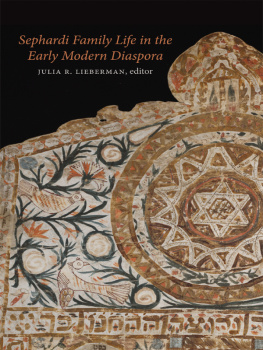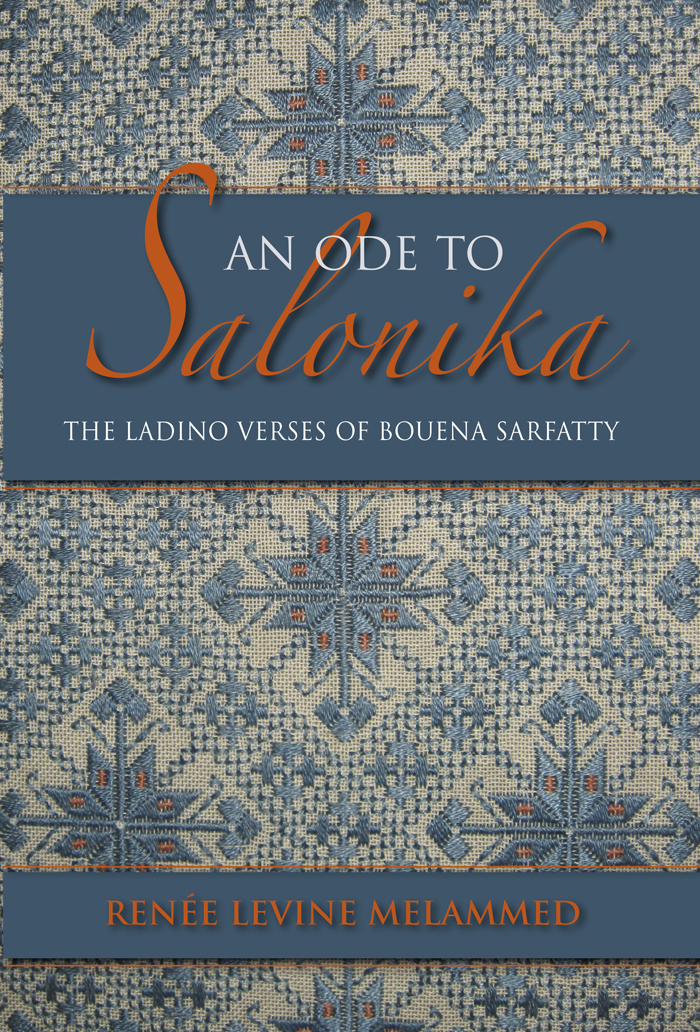AN ODE TO SALONIKA INDIANA SERIES IN SEPHARDI AND MIZRAHI STUDIES Harvy E. Goldberg and Matthias Lehmann,
editors
THE LA DINO VERSES
OF BOUENA SARFATTY ____________ RENE LEVINE MELAMMED Indiana University Press
Bloomington and Indianapolis Published with the generous support of the Helen and Martin Schwartz Endowment. This book is a publication of Indiana University Press 601 North Morton Street Bloomington, Indiana 47404-3797 USA iupress.indiana.edu
Telephone orders 800-842-6796
Fax orders 812-855-7931 2013 by Rene Levine Melammed All rights reserved No part of this book may be reproduced or utilized in any form or by any means, electronic or mechanical, including photocopying and recording, or by any information storage and retrieval system, without permission in writing from the publisher. The Association of American University Presses Resolution on Permissions constitutes the only exception to this prohibition.

The paper used in this publication meets the minimum requirements of the American National Standard for Information SciencesPermanence of Paper for Printed Library Materials, ANSI Z39.48-1992. Manufactured in the United States of America
Library of Congress Cataloging-in-Publication Data Melammed, Rene Levine.
An ode to Salonika : the Ladino verses of Bouena Sarfatty / Rene Levine Melammed. p. cm. (Indiana series in Sephardi and Mizrahi studies) Includes bibliographical references and index. ISBN 978-0-253-00681-3 (cl : alk. paper) ISBN 978-0-253-00709-4 (eb) 1.
Ladino poetry20th century. 2. CoplasGreeceThessalonike. 3. JewsGreeceThessalonikeSocial life and customs20th century. 4.
Jewish womenGreeceThessalonikeIntellectual life20th century. 5. JewsGreeceThessalonikeIntellectual life20th century. 6. Holocaust, Jewish (19391945)GreeceThessalonikePersonal narratives. 7.
Garfinkle, Bouena Sarfatty, (19161995) 8. GreeceHistoryOccupation, 19411944. 9. Thessalonike (Greece)Biography. I. Title.
PC4813.7.M45 2013
861'.62dc23 2012032101 1 2 3 4 5 18 17 16 15 14 13 DEDICATED TO THE MEMORY OF Bouena Sarfatty Garfinkle (19161995) and Denah Levy Lida (19232007) and to the health of Gler Orgun (1947). Each woman transmitted the Sephardi heritage
in her own remarkable way.
CONTENTS
PREFACE
It was purely due to chance that I happened to gain access to the writings of Bouena Sarfatty Garfinkle. In the 1970s, while researching the de Botonsan eminent family of rabbinic scholars, I corresponded with Sephardi communities worldwide. Bouena Sarfatty of Montreal wrote me a letter in French informing me that she knew many de Botons who had perished in Auschwitz. In the fall of 1989 I flew to Montreal to meet her. After recording her memories of this family, we talked about more general topics.
When Bouena heard that I offered a course in the history of the Sephardi Jews during World War II, she told me she had written about the Nazi takeover of Salonika and offered me a large packet of photocopied verses comprising some two hundred pages. I must confess that I was not free at the time to address this material, but in 1995, I consulted with Moshe Shaul, a colleague active in the Ladino world, who was enthusiastic and encouraging. Slowly but surely, I worked my way through these komplas (coplas in Spanish). Having transcribed Inquisition documents, I was familiar with the travails of paleographyyet these pages presented a challenge of their own. Bouenas Ladino, as will be seen in the texts, is characterized by her sometimes-creative orthography; by French, Italian, Greek, and Turkish influences; and by the idiosyncrasies of her handwriting. In order to understand Bouenas poetry, one needs to be acquainted with the history of Salonika as well as with the poets personal history.
Bouena Sarfatty was born November 15, 1916, leaving her brother, Eliaou, to care for his five younger sisters, his mother (who died of cancer in 1940), and his aged maternal grandmother. Eliaou was a dedicated brother who ensured his sisters were well educated and fluent in a number of languages; he also arranged for their debutante presentations. The Nazis invaded Greece in April 1941, when Bouena was not yet twenty-five years old and was engaged to be married to a fellow Salonikan. Bouenas brother, Eliaou; her younger sister, Regina; her centenarian grandmother; and her aunts would all be deported and perish in Auschwitz. An older sister, Marie, moved to Marseilles before the war and her two remaining sisters, Rachel and Daisy, immigrated to Palestine in the 1930s. Bouena remained in Greece and became active in the resistance.
After the war, on July 14, 1946, Bouena married Max Garfinkle, a Ukrainian-born Canadian active in the socialist youth movement Hashomer Hatsair and a founder, in the mid-1930s, of Kibbutz Ein Ha-Shofet. When Italy attacked Greece on October 28, 1940, Bouenas first cousin Samuel and her fianc, Chaim, were drafted into the Greek army. Tia Donna and I were watching the retreating soldiers, and it was the most depressing sight of my life. Some of the soldiers in the ranks were crying. Others couldnt walk anymore. Others were wounded and in pain.
It was a very dark tableau; there was silence in the house. Tia Donna broke the silence.
With this good deed that we will do tomorrow, God is going to help Samuel and Chaim, she said. She had not finished saying this when a soldier escaped from the ranks. He was heading for our door. I went down the stairs and spoke to him from afar.
Come in, come into my apartment.
Its me, Chaim, its me! I heard a very familiar voice say. He came upstairs.
Tia Donna, a woman who never lost her courage, had the bathwater warming before we got upstairs. She took Chaims uniform and he put on pajamas until the bath was ready. She put the khaki clothes in a laundry sack, made a parcel and tied it well, and threw it into the yard as far away as she could.... Two hours later, we could see only German tanks in the street.... When we got up the next morning, the yard was full of parcels with uniforms inside. Everyone had copied Tia Donnas idea: every apartment had soldiers hiding inside.
The community suffered as a result of the German occupation and also faced a severe winter (194142) that was exacerbated by a food shortage. The Red Cross sought to alleviate the situation, as did the Jewish community itself. Bouena, her sister Regina, her best friend Sarah, and other young women offered their services to this international agency. Bouena had previously worked for Matanot La-Evionim, so she essentially was following a similar pathonce again distributing food to the hungry and, in this case, providing milk for children from the working districts. Mothers arrived at the Soupe Populaire with empty bottles and displayed the required cards indicating their daily quotas; volunteers prepared the condensed milk and filled the bottles accordingly. The following morning, she arrived at the Midrash as planned only to find that Chaim had been shot by the Germans and lay dying as he waited for her at the wedding canopy.
Bouena was subsequently arrested and taken to the Pavlos Melas camp on the northern end of Salonika. This was the SS camp in which most of the inmates were political prisoners, and whose fate would be execution. Bouenabearing an Italian passport in the name of Flora Tivoli of Livornoeventually managed to leave by train and arrived in Athens in the Her mission to accompany them to safety was successful. In June 1945, Bouena returned to Greece, ostensibly as a dietitian for the soup kitchens set up by the Palestinian Jewish Relief Unit of the UNRRA for refugees from the camps, but in reality she was an agent assigned to set up an underground railroad to Palestine for survivors. The quartermaster who was sent on a similar mission was her future husband, Max Garfinkle. They were both stationed in a former army camp in Siderokastro, a small town near the Bulgarian border.












 THE LA DINO VERSES
THE LA DINO VERSES The paper used in this publication meets the minimum requirements of the American National Standard for Information SciencesPermanence of Paper for Printed Library Materials, ANSI Z39.48-1992. Manufactured in the United States of America Library of Congress Cataloging-in-Publication Data Melammed, Rene Levine.
The paper used in this publication meets the minimum requirements of the American National Standard for Information SciencesPermanence of Paper for Printed Library Materials, ANSI Z39.48-1992. Manufactured in the United States of America Library of Congress Cataloging-in-Publication Data Melammed, Rene Levine.